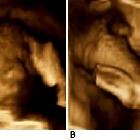identical twins
A monozygotic (MZ) twin pregnancy results from the division of single zygote following fertilisation and shares similar genetic materials. These twins are therefore always of the same gender.
Epidemiology
MZ twins account for approximately 30% of all twin pregnancies . The estimated incidence is at ~1 in 250 births with little racial variation for this subtype (c.f dizygotic pregnancy).
Physiology
Depending on the time of division of the zygote, there can be many possibilities
- division at 1-4 days (morula) results in dichorionic-diamniotic twins (di-di) (DCDA) : 20% of monozygotic twin pregnancies
- division at 4-8 days (blastocyst) results in monochorionic-diamniotic twins (mono-di) (MCDA) : 75% of monozygotic twin pregnancies
- division at 1-2 weeks results in monochorionic-monoamniotic twins (mono-mono) (MCMA): 5% of monozygotic twin pregnancies
- division at > 2 weeks results in conjoined twins: <1% of monozygotic twin pregnancies
Related pathology
Prenatal diagnosis of chorionicity is important as monochorionic pregnancies have increased rates and severity of all types of obstetric complications when compared with dichorionic pregnancies. Monozygotic twins have a higher rate of fetal anomalies although they tend to be discordant-only affecting one twin despite identical genetic makeup.
Monochorionic twin pregnancies share the one placenta and are therefore prone to hemodynamic complications such as:
- twin-twin transfusion
- twin reversed arterial perfusion sequence
- twin embolization syndrome
- acardiac twin
- demise of co-twin
Monochorionic monoamniotic twins also carry additional cord related complications such as:
See also
Siehe auch:
- acardiac twin
- monochorionic twin pregnancy
- Siamesische Zwillinge
- demise of co-twin
- monochoriale-monoamniote Zwillingsschwangerschaft
- twin embolisation syndrome
- dichorionic - diamniotic
- twin reversed arterial perfusion sequence
- dizygotic twins
- Mehrlingsschwangerschaft
- umbilical cord knots
- Thrombose der Umbilikalarterien
- twin-twin transfusion
- monochorionic - diamniotic twins (mono-di) (MCDA)
- Monochorionic monoamniotic
und weiter:

 Assoziationen und Differentialdiagnosen zu monozygotic twins:
Assoziationen und Differentialdiagnosen zu monozygotic twins:



